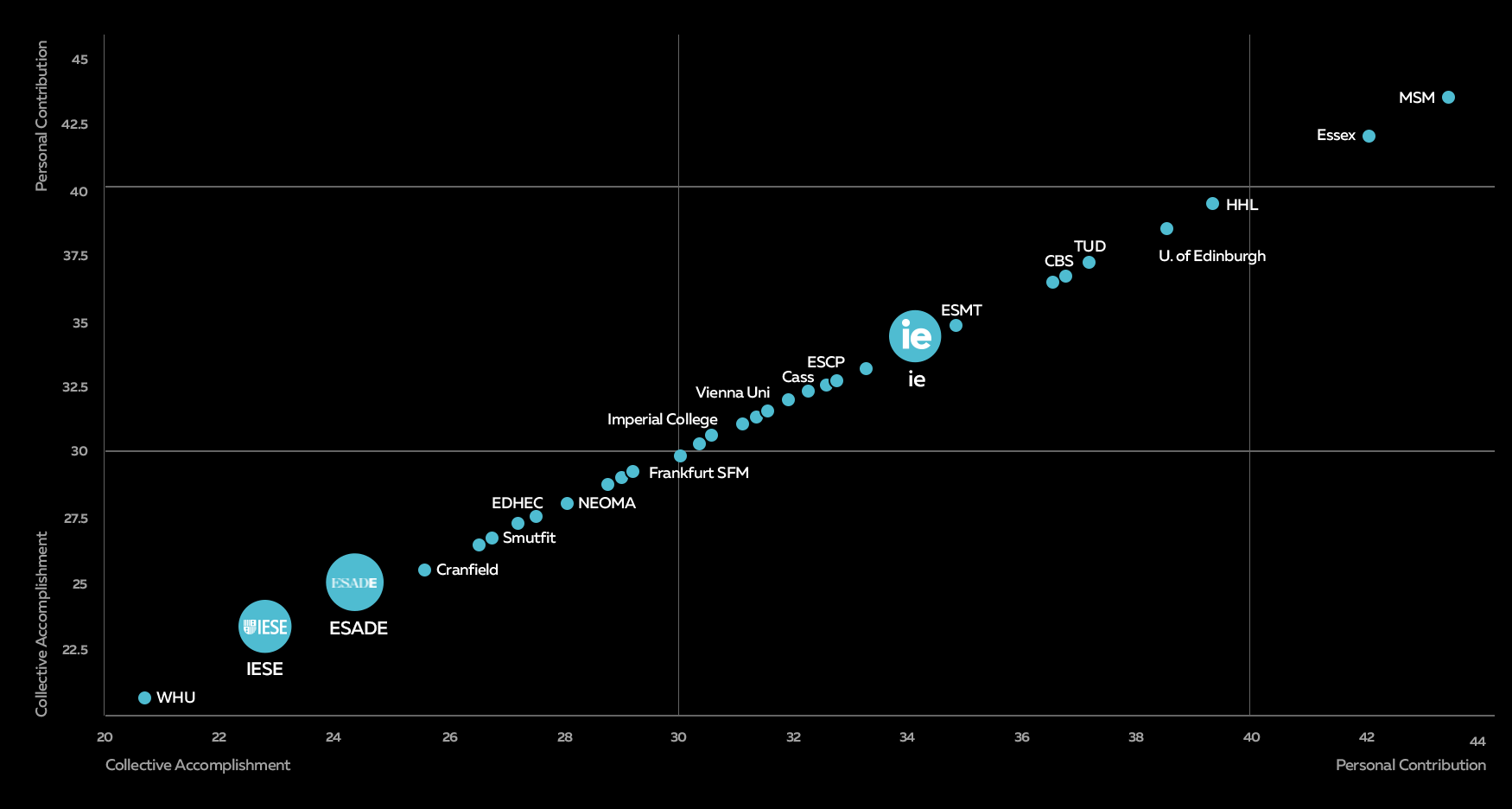
When Juliana Elmais, MBA '22, was looking for an MBA program, she initially researched business schools in the US. Ultimately, she chose IESE business school, attracted by the diversity of its student pool and the more familiar Spanish culture. Juliana, who comes from Brazil, said “I will always be a minority in the US,” adding that feeling welcome was an important factor for her when selecting her study destination.
Juliana, of course, is not alone in her desire to go somewhere where she will feel accepted. Humans are hardwired to seek out welcoming environments. But how can you know in advance if a business school will be welcoming? The MBA Cultural Fit tool on Unimy seeks to solve this problem, offering a scientific way to map out the culture of a particular school.
Community and Collaboration
How does it work? Unimy’s MBA Cultural Fit uses six dimensions to describe the culture and values of universities. One of the dimensions is called “personal contribution vs. collective accomplishment”. IESE’s school culture map shows that the school’s culture clearly leans toward collective accomplishment.
IESE's Cultural Results
Juliana says IESE has a strong sense of community, adding that it’s easy for everyone to find a place within that community where members work together toward a common goal. She found her community in the Women in Business club, where she was elected president.
“The Women in Business club was one of the highlights of my MBA experience. […] I wanted to do an MBA, I want to focus on my career, but also, I wanted to make sure that I’m involved in things I care about. If it’s not the Women in Business club, I’m sure there is going to be another space, another group or community that you feel welcome and where you can be yourself and work together towards something you care about.”
You can hear her full story via our on-demand webinar.
Juliana’s experience confirms Unimy’s findings. The personal contribution vs. collective accomplishment graph for Europe (below) also shows that IESE is second in Europe for collective accomplishment. You can see that another Spanish school, ESADE, is also strong in this quality. For MBA aspirants who value collaboration, this is valuable information. Meanwhile, IE, another Spanish school is the counterpoint to these two with a greater focus on the individual.

The Informal Route to Success
When people feel comfortable and connected with each other, they are more likely to collaborate effectively.
Another dimension on Unimy’s cultural index is called “informal relationship vs. formal relationship”. It describes the degree of formality in relationships between members of the community. In a more informal environment, for example, a student may contact a professor at any time of the day, while a formal environment may require an appointment within office hours.
You know a school is not a stickler for protocol when its admissions team invites potential candidates to an “MBA Coffee chat.” Both the Cultural Fit Map and Ursula Haaker, IESE MBA '22, testify that IESE’s culture scores high on informal relationships.
“When I got in touch with IESE to tell them that I want to visit the campus, I got an immediate response, a personalized agenda, and the opportunity to sit in on a class so I can see what it’s really like. I was even offered a meeting with an alumna from Peru! I was impressed! For them, I was a person, not just another application number.”
Juliana had a similar experience.
“There is a bit of a relationship you build with schools, you talk to admissions teams, you talk to students. When I talked to people at IESE I felt at home. I felt valued and that I can be myself here. I felt perceived as an individual.”
The Importance of Long-term Thinking
IESE’s long-term orientation is another one of its distinguishing features. This is reflected in the “long-term vs ad hoc orientation” dimension, which measures the extent to which people engage in long-term planning and investment, as opposed to acting in response to the present circumstances.
A look at the MBA curriculum at IESE shows that the school emphasizes the value of long-term thinking. This is refreshing in a business world where executives often jeopardize long-term growth by focusing on quarterly profits. IESE definitely endorses Jeff Bezos’ view that “all overnight success takes about 10 years.”
At IESE, the concept of "long term" extends beyond the realm of business; it also characterizes the lasting bond between alumni and the school. Ursula says she chose IESE in part due to the stories shared by her aunt, also an IESE alumna. This generational "passing of the baton" might be viewed as a mere curiosity, but it could very well be a reflection of an enduring culture. As Ursula aptly puts it, "IESE's community is its most valuable asset."
Take our test below to see if IESE is a fit for you.
Comments